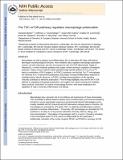| dc.contributor.author | Byles, Vanessa | |
| dc.contributor.author | Covarrubias, Anthony J. | |
| dc.contributor.author | Ben-Sahra, Issam | |
| dc.contributor.author | Lamming, Dudley W. | |
| dc.contributor.author | Manning, Brendan D. | |
| dc.contributor.author | Horng, Tiffany | |
| dc.contributor.author | Sabatini, David | |
| dc.date.accessioned | 2015-04-23T19:03:52Z | |
| dc.date.available | 2015-04-23T19:03:52Z | |
| dc.date.issued | 2013-11 | |
| dc.date.submitted | 2013-08 | |
| dc.identifier.issn | 2041-1723 | |
| dc.identifier.uri | http://hdl.handle.net/1721.1/96762 | |
| dc.description.abstract | Macrophages are able to polarize to proinflammatory M1 or alternative M2 states with distinct phenotypes and physiological functions. How metabolic status regulates macrophage polarization remains not well understood, and here we examine the role of mTOR (mechanistic target of rapamycin), a central metabolic pathway that couples nutrient sensing to regulation of metabolic processes. Using a mouse model in which myeloid lineage-specific deletion of Tsc1 (Tsc1[superscript Δ/Δ]) leads to constitutive mTOR complex 1 (mTORC1) activation, we find that Tsc1[superscript Δ/Δ] macrophages are refractory to IL-4-induced M2 polarization, but produce increased inflammatory responses to proinflammatory stimuli. Moreover, mTORC1-mediated downregulation of Akt signalling critically contributes to defective polarization. These findings highlight a key role for the mTOR pathway in regulating macrophage polarization, and suggest how nutrient sensing and metabolic status could be ‘hard-wired’ to control of macrophage function, with broad implications for regulation of type 2 immunity, inflammation and allergy. | en_US |
| dc.description.sponsorship | American Federation for Aging Research (Julie Martin Mid-Career Award in Aging Research) | en_US |
| dc.description.sponsorship | National Institutes of Health (U.S.) (National Institute on Aging K99/R00 Award 1K99AG041765-01A1) | en_US |
| dc.language.iso | en_US | |
| dc.publisher | Nature Publishing Group | en_US |
| dc.relation.isversionof | http://dx.doi.org/10.1038/ncomms3834 | en_US |
| dc.rights | Article is made available in accordance with the publisher's policy and may be subject to US copyright law. Please refer to the publisher's site for terms of use. | en_US |
| dc.source | PMC | en_US |
| dc.title | The TSC-mTOR pathway regulates macrophage polarization | en_US |
| dc.type | Article | en_US |
| dc.identifier.citation | Byles, Vanessa, Anthony J. Covarrubias, Issam Ben-Sahra, Dudley W. Lamming, David M. Sabatini, Brendan D. Manning, and Tiffany Horng. “The TSC-mTOR Pathway Regulates Macrophage Polarization.” Nature Communications 4 (November 27, 2013). | en_US |
| dc.contributor.department | Massachusetts Institute of Technology. Department of Biology | en_US |
| dc.contributor.department | Whitehead Institute for Biomedical Research | en_US |
| dc.contributor.department | Koch Institute for Integrative Cancer Research at MIT | en_US |
| dc.contributor.mitauthor | Lamming, Dudley W. | en_US |
| dc.contributor.mitauthor | Sabatini, David M. | en_US |
| dc.relation.journal | Nature Communications | en_US |
| dc.eprint.version | Author's final manuscript | en_US |
| dc.type.uri | http://purl.org/eprint/type/JournalArticle | en_US |
| eprint.status | http://purl.org/eprint/status/PeerReviewed | en_US |
| dspace.orderedauthors | Byles, Vanessa; Covarrubias, Anthony J.; Ben-Sahra, Issam; Lamming, Dudley W.; Sabatini, David M.; Manning, Brendan D.; Horng, Tiffany | en_US |
| dc.identifier.orcid | https://orcid.org/0000-0002-0079-4467 | |
| dc.identifier.orcid | https://orcid.org/0000-0002-1446-7256 | |
| mit.license | PUBLISHER_POLICY | en_US |
| mit.metadata.status | Complete | |
